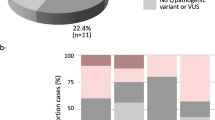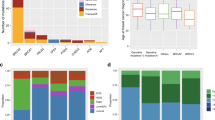Abstract
Certain predisposition factors such as BRCA1/2 and CHEK2 mutations cause familial breast cancers that occur early. In China, breast cancers are diagnosed at relatively younger age, and higher percentage of patients are diagnosed before 40 years, than that in Caucasians. However, the prevalence for BRCA1/2 mutations and reported CHEK2 germline mutations is much lower or absent in Chinese population, arguing for the need to study other novel risk alleles among Chinese breast cancer patients. In this study, we searched for CHEK2 mutations in young, high-risk breast cancer patients in China and detected a missense variant Y390C (1169A>G) in 12 of 150 patients (8.0%) and 2 in 250 healthy controls (0.8%, P=0.0002). Four of the Y390C carriers have family history of breast and/or ovarian cancer. In patients without family history, Y390C carriers tend to develop breast cancer early, before 35 years of age. The codon change at Y390, a highly conserved residue located in CHEK2’s kinase domain, appeared to significantly impair CHEK2 activity. Functional analysis suggested that the CHEK2 Y390C mutation is deleterious as judged by the mutant protein’s inability to inactivate CDC25A or to activate p53 after DNA damage. Cells expressing the CHEK2 Y390C variant showed impaired p21 and Puma expression after DNA damage, and the deregulated cell cycle checkpoint and apoptotic response may help conserve mutations and therefore contribute to tumorigeneisis. Taken together, our results not only identified a novel CHEK2 allele that is associated with cancer families and confers increased breast cancer risk, but also showed that this allele significantly impairs CHEK2 function during DNA damage response. Our results provide further insight on how the function of such an important cancer gene may be impaired by existing mutations to facilitate tumorigenesis. It also offers a new subject for breast cancer monitoring, prevention and management.
This is a preview of subscription content, access via your institution
Access options
Subscribe to this journal
Receive 50 print issues and online access
$259.00 per year
only $5.18 per issue
Buy this article
- Purchase on Springer Link
- Instant access to full article PDF
Prices may be subject to local taxes which are calculated during checkout



Similar content being viewed by others
References
Lacroix M, Leclercq G . The "portrait" of hereditary breast cancer. Breast Cancer Res Treat 2005; 89: 297–304.
Walsh T, King MC . Ten genes for inherited breast cancer. Cancer Cell 2007; 11: 103–105.
Meindl A, Hellebrand H, Wiek C, Erven V, Wappenschmidt B, Niederacher D et al. Germline mutations in breast and ovarian cancer pedigrees establish RAD51C as a human cancer susceptibility gene. Nat Genet 2010; 42: 410–414.
Gutiérrez-Enríquez S, Bonache S, de Garibay GR, Osorio A, Santamariña M, Ramón y Cajal T et al. About 1% of the breast and ovarian Spanish families testing negative for BRCA1 and BRCA2 are carriers of RAD51D pathogenic variants. Int J Cancer 2014; 134: 2088–2097.
Osorio A, Endt D, Fernández F, Eirich K, de la Hoya M, Schmutzler R et al. Predominance of pathogenic missense variants in the RAD51C gene occurring in breast and ovarian cancer families. Hum Mol Genet 2012; 21: 2889–2898.
Apostolou P, Fostira F . Hereditary breast cancer: the era of new susceptibility genes. Biomed Res Int 2013; 2013: 747318.
King MC, Marks JH, Mandell JB . Breast and ovarian cancer risks due to inherited mutations in BRCA1 and BRCA2. Science 2003; 302: 643–646.
Liede A, Narod SA . Hereditary breast and ovarian cancer in Asia: genetic epidemiology of BRCA1 and BRCA2. Hum Mutat 2002; 20: 413–424.
Weischer M, Bojesen SE, Ellervik C, Tybjaerg-Hansen A, Nordestgaard BG . CHEK2- 1100delC genotyping for clinical assessment of breast cancer risk: metaanalyses of 26,000 patient cases and 27,000 controls. J Clin Oncol 2008; 26: 542–548.
Liu C, Wang Y, Wang QS, Wang YJ . The CHEK2 I157T variant and breast cancer susceptibility: a systematic review and meta-analysis. Asian Pac J Cancer Prev 2012; 13: 1355–1360.
Antoni L, Sodha N, Collins I, Garrett MD . CHK2 kinase: cancer susceptibility and cancer therapy - two sides of the same coin? Nat Rev Cancer 2007; 7: 925–936.
Chen W, Yurong S, Liansheng N . Breast cancer low-penetrance allele 1100delC in the CHEK2 gene: not present in the Chinese familial breast cancer population. Adv Ther 2008; 25: 496–501.
González-Hormazábal P, Castro VG, Blanco R, Gómez F, Peralta O, Waugh E et al. Absence of CHEK2 1100delC mutation in familial breast cancer cases from a South American population. Breast Cancer Res Treat 2008; 110: 543–545.
Song Q-K, Li J, Huang R, Fan J-H, Zheng R-S, Zhang B-N et al. Age of diagnosis of breast cancer in china: almost 10 years earlier than in the United States and the European union. Asian Pac J Cancer Prev 2014; 15: 10021–10025.
Kwong A, Cheung P, Chan S, Lau S . Breast cancer in Chinese women younger than age 40: are they different from their older counterparts? World J Surg 2008; 32: 2554–2561.
Vahteristo P, Bartkova J, Eerola H, Syrjäkoski K, Ojala S, Kilpivaara O et al. A CHEK2 genetic variant contributing to a substantial fraction of familial breast cancer. Am J Hum Genet 2002; 71: 432–438.
Brown AL, Lee CH, Schwarz JK, Mitiku N, Piwnica-Worms H, Chung JH . A human Cds1-related kinase that functions downstream of ATM protein in the cellular response to DNA damage. Proc Natl Acad Sci USA 1999; 96: 3745–3750.
Bartek J, Falck J, Lukas J . CHK2 kinase-a busy messenger. Nat Rev Mol Cell Biol 2001; 2: 877–886.
Jiang H, Reinhardt HC, Bartkova J, Tommiska J, Blomqvist C, Nevanlinna H et al. The combined status of ATM and p53 link tumor development with therapeutic response. Genes Dev 2009; 23: 1895–1909.
Jiang H, Pritchard JR, Williams RT, Lauffenburger DA, Hemann MT . A mammalian functional-genetic approach to characterizing cancer therapeutics. Nat Chem Biol 2011; 7: 92–100.
Baloch AH, Daud S, Raheem N, Luqman M, Ahmad A, Rehman A et al. Missense mutations (p.H371Y, p.D438Y) in gene CHEK2 are associated with breast cancer risk in women of Balochistan origin. Mol Biol Rep 2014; 41: 1103–1107.
O'Driscoll M, Jeggo PA . The role of double-strand break repair - insights from human genetics. Nat Rev Genet 2006; 7: 45–54.
Cybulski C, Wokołorczyk D, Jakubowska A, Huzarski T, Byrski T, Gronwald J et al. Risk of breast cancer in women with a CHEK2 mutation with and without a family history of breast cancer. J Clin Oncol 2011; 29: 3747–3752.
Shieh SY, Ahn J, Tamai K, Taya Y, Prives C . The human homologs of checkpoint kinases Chk1 and Cds1 (Chk2) phosphorylate p53 at multiple DNA damage inducible sites. Genes Dev 2000; 14: 289–300.
Shieh SY, Ahn J, Tamai K, Taya Y, Prives C . Phosphorylation of Ser-20 mediates stabilization of human p53 in response to DNA damage. Proc Natl Acad Sci USA 1999; 96: 13777–13782.
Chehab NH, Malikzay A, Appel M, Halazonetis TD . Chk2/hCds1 functions as a DNA damage checkpoint in G(1) by stabilizing p53. Genes Dev 2000; 14: 278–288.
Stott FJ, Bates S, James MC, McConnell BB, Starborg M, Brookes S et al. The alternative product from the human CDKN2A locus, p14 (ARF), participates in a regulatory feedback loop with p53 and MDM2. EMBO J 1998; 17: 5001–5014.
Vogelstein B, Lane D, Levine AJ . Surfing the p53 network. Nature 2000; 408: 307–310.
Ryan KM, Phillips AC, Vousden KH . Regulation and function of the p53 tumor suppressor protein. Curr Opin Cell Biol 2001; 13: 332–337.
Cai Z, Chehab NH, Pavletich NP . Structure and activation mechanism of the CHK2 DNA damage checkpoint kinase. Mol Cell 2009; 35: 818–829.
Ahn J, Urist M, Prives C . The Chk2 protein kinase. DNA Repair (Amst) 2004; 3: 1039–1047.
Bartek J, Lukas J . Chk1 and Chk2 kinases in checkpoint control and cancer. Cancer Cell 2003; 3: 421–429.
Stracker TH, Usui T, Petrini JH . Taking the time to make important decisions: the checkpoint effector kinases Chk1 and Chk2 and the DNA damage response. DNA Repair (Amst) 2009; 8: 1047–1054.
Takacova S, Slany R, Bartkova J, Stranecky V, Dolezel P, Luzna P et al. DNA damage response and inflammatory signaling limit the MLL-ENL-induced leukemogenesis in vivo. Cancer Cell 2012; 21: 517–531.
Bartkova J, Horejsí Z, Koed K, Krämer A, Tort F, Zieger K et al. DNA damage response as a candidate anti-cancer barrier in early human tumorigenesis. Nature 2005; 434: 864–870.
de Miranda NF, Peng R, Georgiou K, Wu C, Falk Sörqvist E, Berglund M et al. DNA repair genes are selectively mutated in diffuse large B cell lymphomas. J Exp Med 2013; 210: 1729–1742.
Consortium CBCC. CHEK2*1100delC and susceptibility to breast cancer: a collaborative analysis involving 10,860 breast cancer cases and 9,065 controls from 10 studies. Am J Hum Genet 2004; 74: 1175–1182.
Wu X, Webster SR, Chen J . Characterization of tumor-associated Chk2 mutations. J Biol Chem 2001; 276: 2971–2974.
Novak DJ, Chen LQ, Ghadirian P, Hamel N, Zhang P, Rossiny V et al. Identification of a novel CHEK2 variant and assessment of its contribution to the risk of breast cancer in French Canadian women. BMC Cancer 2008; 8: 239.
Brinkman H, Barwell J, Rose S, Tinworth L, Sodha N, Langman C et al. Evidence against a major genetic basis for combined breast and colorectal cancer susceptibility. Clin Genet 2006; 70: 526–529.
Cao AY, Hu Z, Shao ZM . Mutation screening of breast cancer susceptibility genes in Chinese high-risk families: the results will develop the genetic testing strategy in China. Breast Cancer Res Treat 2010; 120: 271–272.
Baysal BE, DeLoia JA, Willett-Brozick JE, Goodman MT, Brady MF, Modugno F et al. Analysis of CHEK2 gene for ovarian cancer susceptibility. Gynecol Oncol 2004; 95: 62–69.
Sodha N, Houlston RS, Williams R, Yuille MA, Mangion J, Eeles RA . A robust method for detecting CHK2/RAD53 mutations in genomic DNA. Hum Mutat 2002; 19: 173–177.
Vahteristo P, Tamminen A, Karvinen P, Eerola H, Eklund C, Aaltonen LA et al. P53, CHK2, and CHK1 genes in Finnish families with Li-Fraumeni syndrome: further evidence of CHK2 in inherited cancer predisposition. Cancer Res 2001; 61: 5718–5722.
Acknowledgements
This study was supported by the major scientific research project (2013CB910404), Natural Science Foundation of the People’s Republic of China (No. 81372854; 31371418; 81202096; 81102010), and Shanghai Science and Technology Committee (No. 114119a7500, No. 06DZ19505 and No.13NM1401504). The funders had no role in study design, data collection and analysis, decision to publish or preparation of the manuscript. We thank Dr Qingpeng Kong of the Kunming Institute of Zoology, Chinese Academy of Sciences for his help in analysis of the 1000 human genome project.
Author information
Authors and Affiliations
Corresponding authors
Ethics declarations
Competing interests
The authors declare no conflict of interest.
Rights and permissions
About this article
Cite this article
Wang, N., Ding, H., Liu, C. et al. A novel recurrent CHEK2 Y390C mutation identified in high-risk Chinese breast cancer patients impairs its activity and is associated with increased breast cancer risk. Oncogene 34, 5198–5205 (2015). https://doi.org/10.1038/onc.2014.443
Received:
Revised:
Accepted:
Published:
Issue Date:
DOI: https://doi.org/10.1038/onc.2014.443
This article is cited by
-
Identification and analysis of CHEK2 germline mutations in Chinese BRCA1/2-negative breast cancer patients
Breast Cancer Research and Treatment (2018)
-
CHEK2 represses breast stromal fibroblasts and their paracrine tumor-promoting effects through suppressing SDF-1 and IL-6
BMC Cancer (2016)
-
Prevalence of the CHEK2 R95* germline mutation
Hereditary Cancer in Clinical Practice (2016)



